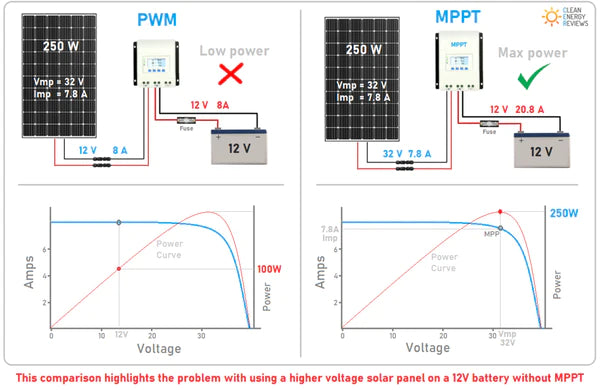?In the world of solar power systems, MPPT (Maximum Power Point Tracking) solar charge controllers play a crucial role in optimizing the efficiency of solar energy conversion. With the increasing popularity of solar panels, it's essential to understand how these controllers work and the benefits they offer.
MPPT solar charge controllers?utilize advanced technology to ensure maximum power output from your solar panels, regardless of environmental conditions. This optimization leads to higher energy yields and more efficient charging of batteries, making MPPT solar charge controllers?a vital component of any solar power system.
Let's delve deeper into the workings and advantages of MPPT solar charge controllers?to understand why they are essential for maximizing solar energy utilization.
Part 1: What is MPPT Solar Charge Controller?
When it comes to harnessing solar energy, a crucial component for efficient power flow and storage is the MPPT (Maximum Power Point Tracking) solar charge controller. BLUETTI?products, including their Power Kits, feature integrated MPPT solar charge controllers that optimize the performance of your solar energy system. Solar panels generate a higher output than batteries can handle, requiring precise control of the energy flow.

The MPPT controller acts as a DC-to-DC converter, receiving voltage from the solar panels and converting it to charge the battery at an appropriate level. By continuously monitoring factors such as panel efficiency, cloud cover, and temperature, the MPPT controller identifies the maximum power point, ensuring your system operates at its peak efficiency.
This process maximizes energy capture and storage, preventing any unnecessary loss. Whether you are building your own solar energy system or opting for BLUETTI products, the inclusion of an MPPT solar charge controller is essential for optimizing solar power utilization and enhancing overall system performance.
Part 2: What is PWM Solar Charge Controller?
In contrast to the MPPT solar charge controller, the PWM (Pulse Width Modulation) solar charge controller is another type of charge controller commonly used in solar energy systems. While not as advanced as MPPT controllers, PWM controllers still play a crucial role in regulating the charging process.
PWM solar charge controllers work by switching the solar panel's voltage output between the battery and themselves. As the battery charges, the controller progressively reduces the voltage applied to the battery to prevent overcharging. This is achieved by varying the width of the pulses sent to the battery, controlling the charging process.
However, unlike MPPT controllers, PWM controllers do not actively track the maximum power point of the solar panels. Instead, they operate at a fixed voltage, which may not optimize energy conversion under varying weather conditions or panel performance.
PWM solar charge controllers are generally more affordable and simpler in design compared to MPPT controllers. They are suitable for smaller solar installations with panels of lower wattage or when cost is a significant factor. However, for larger or more complex systems, MPPT solar charge controllers are recommended to maximize energy capture and efficiency.
Part 3: Differences and Commons between MPPT and PWM Solar Charge Controller
MPPT (Maximum Power Point Tracking) and PWM (Pulse Width Modulation) solar charge controllers are two distinct types of charge controllers used in solar energy systems. While they both serve the purpose of regulating the charging process, there are notable differences between them.
The key difference lies in how they handle the voltage from the solar panels. MPPT controllers actively track and adjust the voltage to find the maximum power point, optimizing energy conversion under various conditions. In contrast, PWM controllers operate at a fixed voltage and reduce the excess voltage by pulsing it on and off, regulating the charging process.
Another difference is in their efficiency. MPPT controllers tend to be more efficient, especially in situations where there are temperature variations, shading, or panel mismatches. They can extract more power from the solar panels, leading to increased energy production. PWM controllers, while simpler and more cost-effective, may result in some energy loss due to their fixed voltage operation.
Despite these differences, both controllers perform the essential function of preventing overcharging and regulating the energy flow from the solar panels to the battery. The choice between MPPT and PWM depends on factors such as system size, budget, and desired efficiency, with MPPT controllers typically recommended for larger or more complex systems where optimal energy conversion is a priority.

Part 4: Advantages of MPPT Solar Charge Controller
MPPT (Maximum Power Point Tracking) solar charge controllers offer several advantages that make them a preferred choice for solar power systems. These benefits contribute to improved efficiency, cost savings, and overall performance:
- More Efficient Power Transfer:?MPPT controllers optimize the voltage and amperage to extract the maximum power from the solar panels. This efficient power transfer ensures that a higher percentage of the rated wattage is stored in the battery, minimizing energy loss and maximizing the utilization of solar energy.
- Less Dependent on Weather:?MPPT controllers adapt to environmental changes and adjust to the varying maximum power point throughout the day. This flexibility enables your system to maintain optimal output even during cloudy or low-light conditions, ensuring consistent energy generation.
- Fewer Panels Needed:?With the higher efficiency of MPPT controllers, you can generate more power from each solar panel. This means you may require fewer panels to meet your energy needs, resulting in cost savings during the initial setup. It also provides greater flexibility in panel placement, optimizing sunlight absorption and conversion.
- More Effective for Large Systems:?As solar arrays grow in size, the impact of improved output from each panel becomes significant. MPPT controllers amplify the power generated by each panel, resulting in substantial overall power gains for large-scale systems.
- Improved Return on Investment:?While MPPT controllers have a higher upfront cost compared to PWM controllers, their enhanced functionality leads to a faster and more complete return on investment. The cost savings from reduced energy expenses and a smaller carbon footprint are realized sooner with the improved efficiency of MPPT controllers.
Part 5: What is Better? MPPT or PWM?
When it comes to choosing between MPPT (Maximum Power Point Tracking) and PWM (Pulse Width Modulation) solar charge controllers, MPPT is generally considered the better option. The BLUETTI AC500 + B300S?is a highly recommended choice as it is equipped with the MPPT feature.
MPPT controllers offer several advantages, including more efficient power transfer, better performance in varying weather conditions, the ability to extract maximum power from each solar panel, and enhanced effectiveness for large-scale systems. These benefits result in increased energy production, cost savings, and a faster return on investment.
The BLUETTI AC500 + B300S, with its integrated MPPT controller, provides optimal energy conversion and utilization. It allows for efficient charging of the battery, maximizes power output from the solar panels, and ensures reliable backup power for your home.
By utilizing MPPT technology, the BLUETTI AC500 + B300S Home Battery Backup offers a superior solar power solution, making it an excellent choice for individuals looking to harness renewable energy efficiently and effectively.

Part 6: People Also Ask about MPPT Solar Charge Controller
- Does MPPT work better with high voltage?
Yes, MPPT solar charge controllers generally work more efficiently with higher voltage. Higher voltage allows for reduced current, which minimizes losses due to resistance and enables more effective power conversion. MPPT controllers can handle a wide range of input voltages, allowing them to optimize power output even in systems with high voltage solar panels.
- What is the disadvantage of MPPT?
One potential disadvantage of MPPT solar charge controllers is their higher cost compared to PWM controllers. MPPT controllers incorporate advanced technology and features, which contribute to their superior efficiency but also increase the price. However, the benefits of improved energy production and faster return on investment often outweigh the initial cost.
- Why MPPT is required?
MPPT controllers are required in solar power systems to maximize energy conversion and optimize power output. They actively track and adjust the voltage and current from the solar panels to find the maximum power point, ensuring efficient charging of batteries.
MPPT controllers adapt to environmental changes, such as temperature variations and shading, allowing the system to generate the highest possible output under different conditions.
- Can MPPT work without a battery?
Yes, MPPT controllers can work without a battery. They can regulate and optimize the power output from solar panels for direct use in DC appliances or for feeding into an AC grid. In such cases, the MPPT controller ensures that the maximum power point is tracked and the power is efficiently utilized without the need for battery storage.
This makes MPPT controllers versatile for various applications, whether with or without battery backup.



